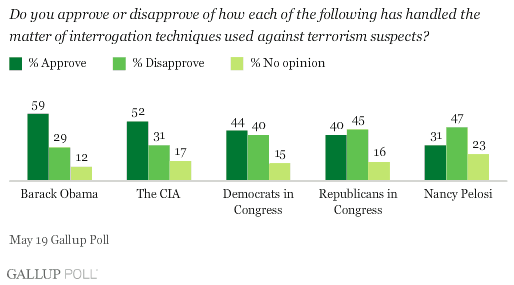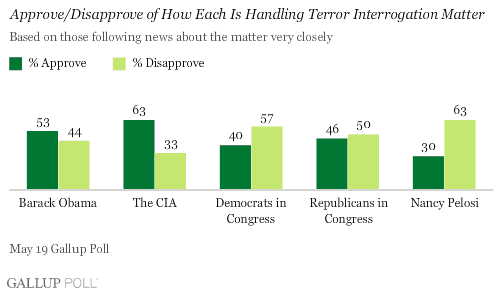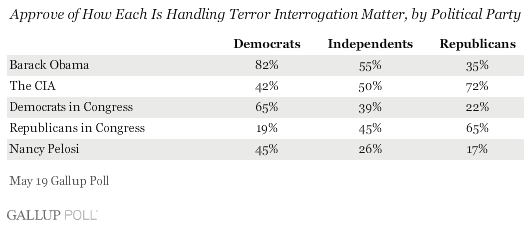PRINCETON, NJ -- More Americans disapprove than approve of House Speaker Nancy Pelosi's handling of the matter concerning the government's use of harsh interrogation techniques on terrorism suspects. Majorities approve of President Barack Obama's and the CIA's handling of the matter.

Even though Obama has pledged that the United States will no longer use harsh interrogation techniques (like waterboarding) that many consider to be torture, the issue has remained in the news, with some in Congress -- including Pelosi -- calling for an investigation into the use of such techniques during the Bush administration.
Last week, Pelosi attempted to respond to allegations that she learned of the use of waterboarding in September 2002 during a CIA briefing of congressional leaders. In her press conference, she asserted that the CIA misled her by denying that waterboarding was being used, even though government reports indicate it had been used on an al Qaeda terror suspect in the month prior to that briefing. The CIA responded and disputed her assertions that the agency misled her. Republican leaders have roundly criticized her remarks.
Sixty percent of Americans say they are following the news about the government's use of harsh interrogation techniques closely, including 22% who say they are following it "very closely." Republicans (66%) are slightly more likely than independents or Democrats (each 59%) to be following the matter closely.
The May 19 poll finds Pelosi largely losing the public relations game, as she gets a significantly more negative review for her handling of the matter than do the other major players in the controversy, including the CIA. Also, notably, Americans are much more critical of Pelosi's handling of the matter than they are of the broader group of the Democrats in Congress she leads as speaker of the House.
Those who are paying the closest attention to the matter are especially critical of Pelosi, with 63% of this group disapproving of her, compared with just 30% who approve. This highly attentive group is generally somewhat more critical than the general public is of each of the actors -- aside from the CIA, which is rated much more positively by those who are following the matter closely (63% approve) than by the broader population (52% approve).

As might be expected, Republicans and Democrats have very different opinions on how each of the actors has handled the matter. Democrats generally approve of the way Obama, congressional Democrats, and Pelosi have reacted, while Republicans evaluate the Republicans in Congress' and the CIA's actions positively. Democrats are about evenly divided in their evaluations of the CIA -- with 42% approving and 41% disapproving. By comparison, Pelosi's rating among Democrats is more positive than negative, 45% to 31%.

Implications
Although there are no trend data on this particular question, it appears that Pelosi's attempt last week at damage control did not do a great deal to bolster her image on the interrogation situation. More Americans disapprove than approve of her handling of the interrogation matter, particularly those paying a high level of attention to the controversy. Also, Americans make a clear distinction between Pelosi and her fellow Democrats in Congress and in the White House. So far, the Democratic caucus is standing firmly behind its leader. But the controversy is certainly an unwelcome distraction to the Democrats as they seek to pass an ambitious agenda this summer.
Survey Methods
Results are based on telephone interviews with 997 national adults, aged 18 and older, conducted May 19, 2009. For results based on the total sample of national adults, one can say with 95% confidence that the maximum margin of sampling error is ±3 percentage points.
Interviews are conducted with respondents on land-line telephones (for respondents with a land-line telephone) and cellular phones (for respondents who are cell-phone only).
In addition to sampling error, question wording and practical difficulties in conducting surveys can introduce error or bias into the findings of public opinion polls.
Polls conducted entirely in one day, such as this one, are subject to additional error or bias not found in polls conducted over several days.
